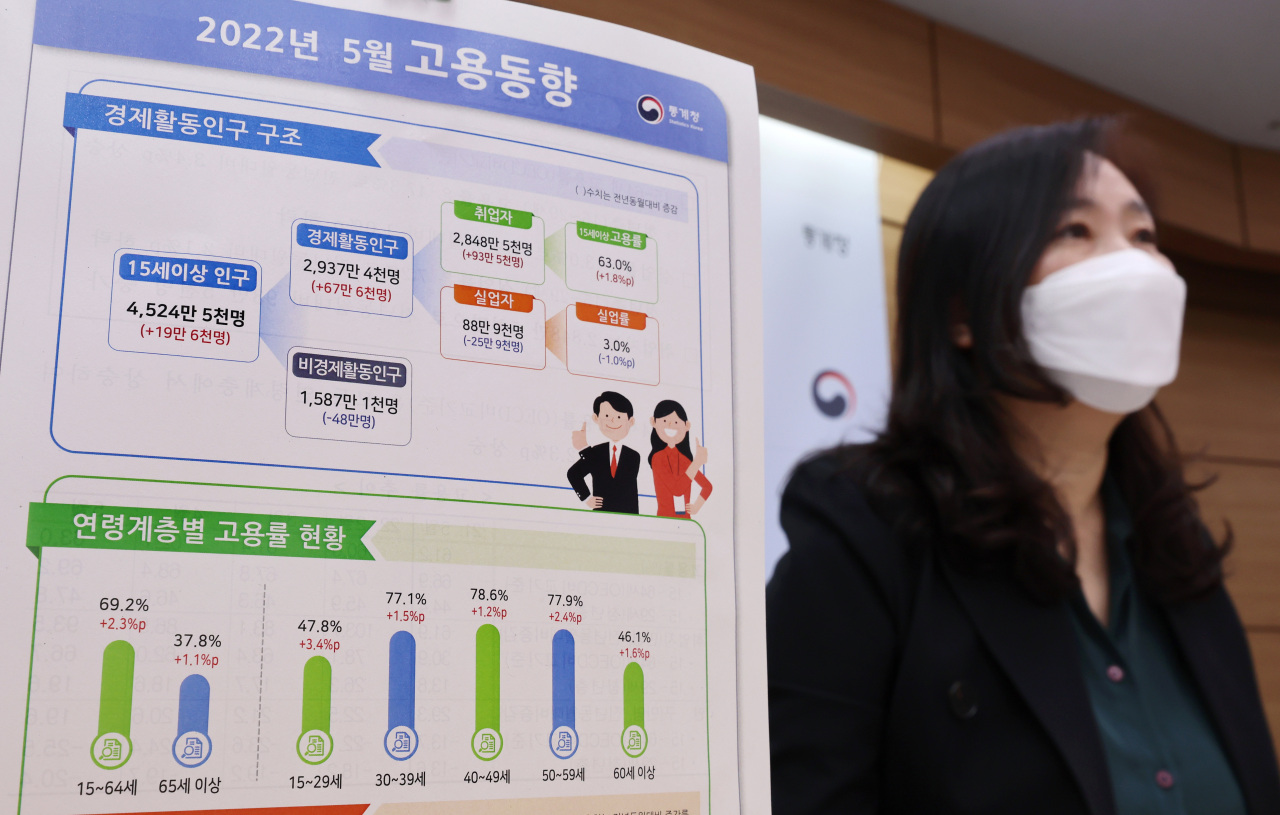SEJONG -- The number of people employed in South Korea increased by more than 900,000 in May from a year earlier, which marked the largest job increase in 22 years for that month.
But figures showed that men in their 60s or older made up more than 30 percent (32.4 percent) of the total increase, state data showed Wednesday.
According to Statistics Korea, the number of jobs came to 28.48 million as of last month, up 935,000 on-year. This posted the largest growth since May 2000, when an increase of 1.03 million was reported.
The sharp increase was attributed to fast economic normalization from the COVID-19 pandemic and base effect, officials said.
But detailed data indicated relatively meager progress in employment conditions among younger or middle generations, particularly among men aged under 50.
The tally for jobs increased by 468,000 among men overall. While men in their 60s or over posted growth by 303,000 -- 64.7 percent of the increase for men (468,000) and 32.4 percent of the increase for both men and women (935,000) -- and men in their 50s by 105,000, the figure for those in their 40s inched up only 13,000.
Further, men in their 30s and men aged 15-19 recorded decreases by 20,000 and 3,000, respectively. Job increases for men in their 20s stayed at 70,000.
The situation was similar among women: While 156,000 and 134,000 jobs were added for women in their 60s or older and those in their 50s, respectively, the number of women employed among 40-somethings and 30-somethings increased only 23,000 and 25,000.
This suggested that almost half (49 percent) of the total job additions were led by a surge in local government or big retailer-arranged temporary jobs for seniors.
Statistical data also showed that men still far outstripped women in the employment rate last month, 72.4 percent vs. 53.8 percent. A year earlier, corresponding figures were 70.5 percent vs. 52.1 percent.
By sector, a 10.4 percent growth was reported in information and communication, 8.5 percent in public and social welfare administration, 7.9 percent in agriculture and fisheries, 7.7 percent in logistics, 6.5 percent in real estate and 3.4 percent in construction.
Statistics Korea director general Kong Mi-sook said that “the number of jobs in-person services increased on the back of going back to normal life (from formerly social distancing). And the number of economically inactive population declined.”
In line with the sharp job increases, the tally for discouraged workers -- who abandoned job-seeking activities -- declined by 188,000 on-year to 424,000 in May.
The number of discouraged workers has continued to fall this year -- 527,000 in January, 513,000 in February, 464,000 in March and 431,000 in April.
The tally for economically inactive people -- those who are neither working nor actively seeking jobs or people outside the labor force -- reached 15.87 million in May, down 480,000 from a year earlier. It marked the 15th consecutive month of an on-year decline.
The government’s official jobless rate posted 3 percent in May with the number of unemployed staying at 889,000.
But the Supplementary Index III for Employment, another data held by Statistics Korea, showed that the de facto jobless rate came to 10.7 percent, with the number of underemployed or unemployed reaching 3.31 million in the nation.
By Kim Yon-se (
kys@heraldcorp.com)








